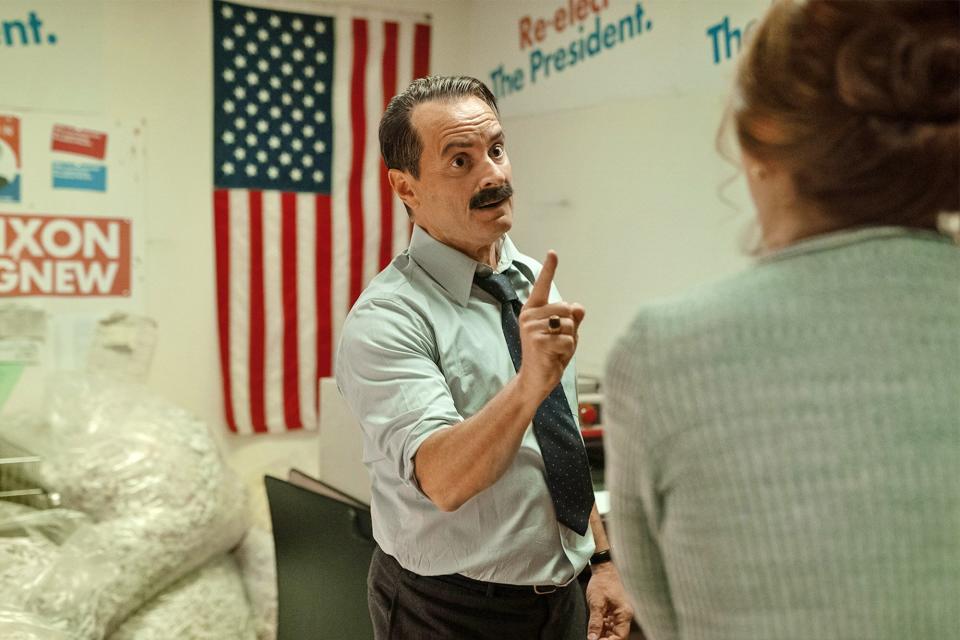Gaslit creator and stars explain why everyone can relate to their new take on Watergate
- Oops!Something went wrong.Please try again later.
To put it in Entertainment Weekly parlance, a good alternate title for Gaslit might be "Untold Stories: Watergate Edition." The Starz drama, premiering Sunday, gives the stage to the forgotten players and unsung heroes (and would-be heroes) of American history's most notorious political scandal, from the bungling operatives who planned the Watergate break-in and the security guard who discovered it, to a White House lawyer who would eventually turn on Richard Nixon's administration.
But the heart of the series is Martha Mitchell, the glamorous wife of onetime Attorney General and longtime Nixon crony John Mitchell (played by Sean Penn, under a heap of prosthetic makeup). The outspoken Martha tried to go public about Watergate early on, but was smeared by her husband and his powerful allies and largely dismissed in the press. As played by Julia Roberts, Martha anchors Gaslit throughout its eight episodes, to the degree that an actual alternate title for the show was The Martha Mitchell Effect — a real psychological term for when a patient's beliefs are dismissed as delusions, but are actually true.
"It means basically the same thing as being gaslit," explains creator Robbie Pickering. "And I think [the title] Gaslit reflects the take we have on the show. We want to do this period in a way that feels fresh and new and exciting and fun, and also dark."

Hilary Bronwyn Gayle/Starz Sean Penn and Julia Roberts in 'Gaslit'.
"Anyone who was born from 1960 to 1990 thinks they know everything there is to know about Watergate," says Roberts. "To be able to say, 'Hold on a minute, because there's this critical piece of the puzzle that you don't understand at all,' really creates a paradigm shift with the way that you see all the characters in Watergate. It has this domino effect on the whole story."
Indeed, viewers tuning into Gaslit for a taut political thriller — a la the definitive Watergate dramatization, and inevitable comparison point, All the President's Men — will get a very different experience: something knottier, more expansive, and, the creators hope, more human.
"One of the most annoying things about movies or shows about political corruption is this feeling of superiority the filmmakers have toward some of the characters," says Pickering, who name-checks ATPM along with Oliver Stone's Nixon as "movies that felt very 'heroes and villains' " in their depiction of Watergate. "I thought I could bring a relatability to the villains and a complexity to the quote-unquote heroes that would make it feel more modern, and that people would see themselves in. I encouraged every writer in the room, 'Find the bad qualities in these people that you see in yourself.' "
The resulting series is the culmination of Pickering's lifelong fascination with the 37th president. The former Mr. Robot writer grew up in "a very evangelical, right-wing family" in Texas, and vividly recalls a childhood memory of his mother "weeping" while watching Nixon's funeral on TV.
"From that moment, I was just like, 'I gotta read all about this guy,' " Pickering says. "And the history of Nixon and the culture around Nixon doesn't disappoint. It's a real locus point in history — a lot of things we're going through now in our politics, a lot of the enmity and polarization and the culture war stuff, really starts on the national scale with Nixon."

Starz Julia Roberts as Martha Mitchell in 'Gaslit'
Despite that, "nobody was really interested" in Pickering's attempts to bring a Nixon-focused project to the screen, he says, "until Slow Burn came along." The hit Slate podcast debuted in November 2017, with a season looking back at the forgotten "subplots" of Watergate, as host Leon Neyfakh put it in the first episode. That debut entry focused on the story of Martha Mitchell, and gave Pickering a springboard into what would become Gaslit.
"I had read a lot about Martha, but even in the histories that I read, she was really just a side story, and a lot of the history of the period has dismissed her," says the showrunner. "The podcast really centered her, and the success of it showed that was a story that people wanted to hear."
Pickering's boss on Mr. Robot, Sam Esmail, quickly picked up the rights to Slow Burn (Esmail is an executive producer on Gaslit), but adapting the podcast for television required Pickering to "find an overarching story to hang [the show] on," he explains. He found it in two couples that were profoundly affected by the events of Watergate, one naturally being the Mitchells, who separated in 1973 over John's role in the scandal.
"It's so ultimately sad, the way politics and corruption really destroyed their marriage," Roberts says. "She didn't live long after all of this happened, so I think it's all sort of connected. Maybe if he had chosen her over Nixon, her life would have been very different." (Martha died in 1976, just three years after separating from John.)
The other central couple provides a study in contrast, a marriage beginning as the Mitchells' is ending. Dan Stevens plays John Dean, an ambitious lawyer who became Nixon's White House counsel, and whose involvement in Watergate strained his budding relationship with his eventual wife, Mo (played by Betty Gilpin).

Starz Dan Stevens and Betty Gilpin as John and Mo Dean on 'Gaslit'
"Over the course of the season, she senses that something is wrong, he's having some affair or something," Gilpin says of her character. "And then she realizes it's not an affair. It's not a hot redhead, it's mass corruption. Nixon is the hot redhead in this scenario."
"It's a pretty schizophrenic existence that [Dean] has to lead at certain points," adds Stevens. "He thought he was getting in with the big boys playing politics, and then it turns out he's into some pretty shady business, whilst also trying to cultivate a wonderful relationship. The secrecy versus the openness in the marriage, and the communication versus the clandestine skullduggery is inherently very dramatic."
Those two relationships gave Pickering the emotional throughline he needed for the show. "Martha's relationship with John, this deep love that they had for each other, really traces the length of the scandal, as does the young love between John Dean and Mo Dean," he explains. "So I was able to set those relationships in juxtaposition and show how they both change over the course of the story."
While the two couples give the show its emotional heft, some more familiar figures do pop up to provide, in their own way, some levity. Here's where more names you might know from All the President's Men come in, most notably G. Gordon Liddy, played by prolific character actor Shea Whigham. The eccentric Liddy planned "Operation Gemstone," a set of improbable operations to embarrass Nixon's opponents (such as photographing Democratic officials with prostitutes), orchestrated the bungled Watergate break-in, and ultimately served more than four years in prison.
"Whenever I take on any of my characters — and a lot of them are, for lack of a better word, unsavory — I never judge them. And I didn't want to judge Liddy," Whigham says. "I had to figure out what made him human, and that really came down to, he never named names. He wasn't a snitch, and he did his time. That was where I started."

Starz Shea Whigham as G. Gordon Liddy in 'Gaslit'
From there, he continues, "You have to play the truth, and through that comes the comedy. Let's say, you spend weeks putting Gemstone together, and then to present it to Mitchell and Dean and to be laughed out of the room — that's where you start feeling for him on different levels. I wanted to make him as human as possible."
That approach sums up the ethos of Gaslit in general, too. "To make this show, I really had to dig into the humanity of all these people," Pickering says. "And when you dig into that, the question you ask yourself is, 'Why are these people complicit in awful things, when they know that Nixon is going to throw them under the bus?' And there are really relatable reasons for it. They're doing it because they're ambitious, as John Dean did, or they're doing it because they feel valued by somebody in power, like John Mitchell did."
Adds Gilpin, "Martha Mitchell is such an example of how we have gotten it wrong so many times. I think that what we Americans like to do is say, 'Only evil people were pushing these voices to the sidelines or were outwardly misogynist or outwardly racist.' And I think that what our story touches on is how much those things were in the groundwater for everyone."
Clearly, it's an idea that echoes forward through history — not just to the Trump era, of which Slow Burn was very much a product, but also, Pickering argues, to right now, and whatever might come after.
"I think that this level of corruption and complicity is always in all of us," he says. "It doesn't surface because of one man, or the unique conditions in this time in history. It surfaces because we all have the same emotional pitfalls. Everybody has done something that, in some way, goes against who they ideally think of themselves to be.
"But also," he adds, "everybody has this capacity within them to be heroic. And that often comes from just as messy a place as complicity."
Gaslit premieres Sunday at 8 p.m. ET/PT on Starz. You can see more from the cast and Pickering in the video above.
Sign up for Entertainment Weekly's free daily newsletter to get breaking TV news, exclusive first looks, recaps, reviews, interviews with your favorite stars, and more.
Related content:

